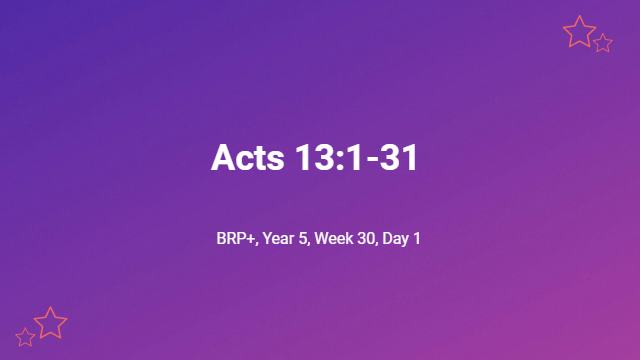Acts 13:1-31
Q.1. What was significant about the call of Barnabas and Saul to missionary service? Why was the church’s endorsement crucial? Who was in charge of the mission? Who made up the team? Where did they start their mission? (Acts 13:1-5).
The call of Barnabas and Saul to spread the Gospel was a combination of the Holy Spirit’s direction, and the church’s desire to do whatever God wanted (see Acts 13:1-2). The church’s leaders at Antioch were from far-ranging places, such as Jerusalem and Cyrene in North Africa. They were also from different socio-economic circumstances. Interestingly, they were called to commission and send out the best of their prophets and teachers. This was immediately following a special time of prayer and fasting. This gave the church planters assurance that the sending church would support them with fervent prayers (see Acts 13:3). Barnabas led the team. It included Saul and John Mark, the cousin of Barnabas (see Col.4:10). They likely began in Cyprus, because their converts were among the first to take the gospel to the Gentiles after the persecution in Jerusalem (see Acts 11:19-21). It would be their practice – to proclaim the Word of God in the synagogue of the Jews first (see Acts 13:5). These Jews in the synagogues were well grounded in the Scriptures. Therefore, it was easier for the apostles to explain how Christ had fulfilled the prophecies of their Scriptures written from ancient times (see Lk.24:26-27, 44-46).
Q.2. Does it surprise you that there was opposition? How was it dealt with? How do we account for this? How did this promote the Gospel? – (Acts 13:6-12 c.f. 2 Cor.12:11-13) = One thing we can count on, is opposition to the Gospel. Not surprisingly, at Paphos, a Jewish false prophet tried to undermine their ministry to the proconsul, Sergius Paulus – But Elymas the magician (for so his name is translated) was opposing them, seeking to turn the proconsul away from the faith (Acts 13:8). Saul withstood him and – 9 … filled with the Holy Spirit, fixed his gaze on him, 10 and said, “You who are full of all deceit and fraud, you son of the devil, you enemy of all righteousness, will you not cease to make crooked the straight ways of the Lord? (Acts 13:9-10). Elymas was then struck blind for a season – Then the proconsul believed when he saw what had happened, being amazed at the teaching of the Lord (Acts 13:12). When God broke through supernaturally, as He did here, Luke made it clear that this extraordinary event was caused by God Himself, and not by any man described as being ‘filled with the Holy Spirit’. It was recorded that Saul was also known as Paul. From this time, he was called by that name (c.f. Acts 13:9). From this time onwards, Paul was also recognized as the key leader of the team (c.f. Acts 13:13, 42 etc).
Q.3. What is the lesson of John Mark’s leaving? How well were the men received by the synagogue? Who took the lead in preaching the Gospel? – (Acts 13:13-16 c.f. 15:36-41) = We don’t know exactly why Mark left, but Paul felt strongly about his desertion. This later caused a serious rift between Paul and Barnabas (Acts 13:13 c.f. 15:38). The synagogue officials at Pisidian Antioch gave them open access to bring an exhortation. Paul took up the offer with relish (Acts 13:14-16).
Q.4. How did Paul review the history of Israel? What insights did he give about David? Would they have known about the ministry of John the Baptist? What happened to the One heralded by John? What amazing claim did Paul make about Jesus? – (Acts 13:17-31) = Paul summarized the birth of the nation, their wilderness journeys, and eventual settlement into the Promised Land. He passed quickly over Samuel the prophet and King Saul and focused on King David. He highlighted David’s credentials from his divine calling – … concerning whom He also testified and said, `I have found David the son of Jesse, a man after My heart, who will do all My will.’ (Acts 13:22). He added the identity of the Promised One through David – from the descendants of this man, according to promise, God has brought to Israel a Saviour, Jesus (Acts 13:23). It is clear that they were well informed about John the Baptist. Paul reminded them that John pointed the people to Jesus Christ (Acts 13:24-25). He charged the Jews and their leaders with ignorance of the prophecies regarding Jesus. Because of this, they had Jesus put to death – when they carried out all that was written concerning Him (Acts 13:29 c.f. 13:26-29). Paul then made the staggering claim that – 30 But God raised Him from the dead; 31 and for many days He appeared to those who came up with Him from Galilee to Jerusalem, the very ones who are now His witnesses to the people (Acts 13:30-31). This was news indeed.

